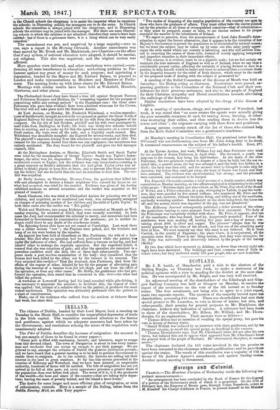SCOTLAND.
Mr. J. B. Smith, of Manchester, paid a visit to the electors of the Stirling Burghs, on Thursday last week, to make a statemeut of his political opinions with a view to standing for the district at the next elec- tion, He was accompanied by Mr. Bright, and was very well received.
An adjourned meeting of the shareholders of the Edinburgh and Glas- gow Railway Company was held at Glasgow on Monday, to receive the report of the scrutineers on the vote of the 5th instant as to Sunday trains. The four scrutineers, not being able to agree to a joint report, made two separate reports. The question of the majority turned upon ten shareholders, possessing 115 votes. These ten shareholders had sent their special proxies to Mr. Lumsden, to vote in favour of trains; but also, and subsequently, their proxies for general purposes to Mr. Blackburn, the chairman, without any indication of opinion. A reference had been made to three of the shareholders, Mr. Hilton, Mr. Willink, and Mr. Thorn- thwaite, for an explanation. Their answers were as follows- " Thomas Hilton had no intention of recalling the special proxy, but gave Ilia vote in favour of Sunday trains.
"Daniel Willink was induced by an interview with three gentlemen, and by the Directors' circular, to recall the special proxy, as beneficial to the concern. "Thomas Thornthwaite says, that Mr. Cheetharu's letter did not alter his own views, but induced him not to oppose what appeared from Mr. Cheetbam's letter the general wish of the people of Scotland. He' de/ermined, therefore, to remain neuter.'" The chairman declared the 115 votes involved in the ten proxies to have been intrusted to the chairman without qualification; and he gave them against the trains. The result of this conclusion was a majority of 152 in favour of Sir Andrew Agnew's amendment, and against Sunday trains. Another special meeting is threatened.


























 Previous page
Previous page